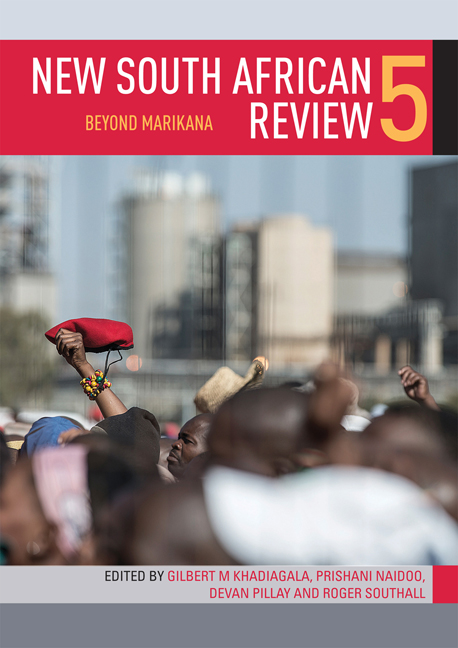Book contents
- Frontmatter
- Contents
- Preface
- Introduction: Political reconfigurations in the wake of Marikana
- PART 1 NEW POLITICAL DIRECTIONS?
- PART 2 ECONOMY, ECOLOGY AND LABOUR
- Introduction to Part 2
- Chapter 4 The South African economy: The minerals-energy-finance complex redubbed?
- Chapter 5 Between a rock and a hard place: State-business relations in the mining sector
- Chapter 6 The platinum belt strike wave: Breakdown in the institutionalisation of industrial conflict
- Chapter 7 When gold mining ends: An environmental catastrophe for Johannesburg?
- PART 3 STATE AND SOCIETY
- PART 4 SOUTH AFRICA IN THE INTERNATIONAL ARENA
- Contributors
- Index
Chapter 7 - When gold mining ends: An environmental catastrophe for Johannesburg?
from PART 2 - ECONOMY, ECOLOGY AND LABOUR
Published online by Cambridge University Press: 21 April 2018
- Frontmatter
- Contents
- Preface
- Introduction: Political reconfigurations in the wake of Marikana
- PART 1 NEW POLITICAL DIRECTIONS?
- PART 2 ECONOMY, ECOLOGY AND LABOUR
- Introduction to Part 2
- Chapter 4 The South African economy: The minerals-energy-finance complex redubbed?
- Chapter 5 Between a rock and a hard place: State-business relations in the mining sector
- Chapter 6 The platinum belt strike wave: Breakdown in the institutionalisation of industrial conflict
- Chapter 7 When gold mining ends: An environmental catastrophe for Johannesburg?
- PART 3 STATE AND SOCIETY
- PART 4 SOUTH AFRICA IN THE INTERNATIONAL ARENA
- Contributors
- Index
Summary
As South Africa enters its third decade of democracy, the economic heartland centred on Johannesburg is facing a major crisis. The drivers of this crisis are complex, potentially providing a perfect storm as they converge. The public remains largely ignorant of what awaits them and the regulatory response has been muted, muddled and misguided at best. This chapter seeks to describe, in layperson's terms, the environmental disaster unfolding around the financial hub of Africa as three key drivers – the end of the production life of the gold mining industry, the failure of the regulatory environment over the last century adequately to plan for a post-mining future and a transition to a waterconstrained national economy – come together. The chapter will argue that these three drivers are converging at the same time that government's capacity to respond seems to be at its weakest in the history of our young democracy. The main focus will be on an analysis of the environmental and social issues associated with the legacy of gold mining to show that Johannesburg is the epicentre of a slow onset disaster, and is increasingly going to be known as the most uranium-contaminated city in the world – unless we can reverse this trend through policy reform to attract investment into the many brownfields mining sites that now dominate the landscape.
THE GOLD MINING DILEMMA
A staggering 40 per cent of the gold ever produced on the entire planet in all recorded history comes from the Witwatersrand goldfields (Hart 2013). The discovery of gold in 1886 changed the trajectory of the South African economy forever (Turton et al. 2006). Triggering the Second Anglo-Boer War that led ultimately to the decimation of the Afrikaner nation, not on the field of battle, but in the squalor of the concentration camps arising from the scorched earth policy instituted by the British (Porch 2000), this whole process created a civil service and a legal system designed to maximise profits from mining by externalising all environmental and social liabilities (Turton 2009, 2015). That bureaucracy functioned with ruthless efficiency from the Act of Union in 1910 until the transition to democracy in 1994 (Turton 2010, 2015).
- Type
- Chapter
- Information
- New South African Review 5Beyond Marikana, pp. 120 - 142Publisher: Wits University PressPrint publication year: 2015



